Lottery for a life
Residents on Island Lake reserves keep their desperate fingers crossed that they'll be next in line to join the 21st century and get running water
Advertisement
Read this article for free:
or
Already have an account? Log in here »
To continue reading, please subscribe:
Monthly Digital Subscription
$0 for the first 4 weeks*
- Enjoy unlimited reading on winnipegfreepress.com
- Read the E-Edition, our digital replica newspaper
- Access News Break, our award-winning app
- Play interactive puzzles
*No charge for 4 weeks then price increases to the regular rate of $19.00 plus GST every four weeks. Offer available to new and qualified returning subscribers only. Cancel any time.
Monthly Digital Subscription
$4.75/week*
- Enjoy unlimited reading on winnipegfreepress.com
- Read the E-Edition, our digital replica newspaper
- Access News Break, our award-winning app
- Play interactive puzzles
*Billed as $19 plus GST every four weeks. Cancel any time.
To continue reading, please subscribe:
Add Free Press access to your Brandon Sun subscription for only an additional
$1 for the first 4 weeks*
*Your next subscription payment will increase by $1.00 and you will be charged $16.99 plus GST for four weeks. After four weeks, your payment will increase to $23.99 plus GST every four weeks.
Read unlimited articles for free today:
or
Already have an account? Log in here »
Hey there, time traveller!
This article was published 05/11/2011 (5151 days ago), so information in it may no longer be current.
ST. THERESA POINT — Zach Harper waited 75 years for a house with running water and a flush toilet.
One week after Harper got it, he died.
Asked last year whether he believed the federal government would ever fund proper plumbing for him, the widower was skeptical.

“He’ll ask God that question,” said his son-in-law Geordie Rae, translating the elder’s Oji-Cree.
But Harper’s house made it onto the band’s priority list this year, and renovations worth about $40,000 started in early July. The construction crew gutted Harper’s dingy bungalow, installed underground pipes and plumbed a real bathroom. The crew was even mulling over the best way to use leftover wood to build a ramp into the home for Harper’s wheelchair.
While the house was being gutted, Harper, a tuberculosis survivor, spent the summer living nearby with daughter-in-law Debbie Harper, getting spoiled with extra TLC and spotless surroundings, even though he initially refused to leave his home. He was so thin and fragile, the band was considering trying to get him to go into a nursing home.
After a long lifetime of hauling water, making do with a slop pail and trying to save up $5,000 to connect his house to the main water line right outside his front door, Harper died a week after he returned home.
“At least he was able to see his house,” said Debbie Harper. “We’re very at peace with it.”
Beyond the too-little-too-late timing, there’s some good news.
Harper’s family, including Geordie Rae, his wife, Rose, and their five children, will still get to live in the home, ending their long wait for running water. They lived with Harper for several years because he needed help caring for himself and the Raes needed a place to live.
Rae said it’s a fresh start for the family. They’ll get all-new furniture from the Northern Store and Rose will be able to give three-year-old Lucas a proper bath for the first time. He’s far outgrown his baby basin.
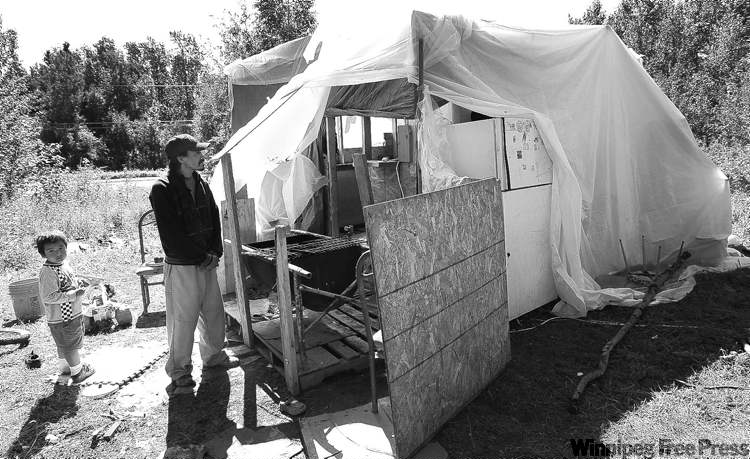
“It feels like ‘relief.’ I feel better inside,” Rae said in late August as he watched crews put the finishing touches on the house.
“I don’t have to worry about getting water every day. Especially when you don’t have a vehicle, you have to carry it by pails.”
— — —
Take Geordie and Rose Rae’s new home and multiply it by 200, and St. Theresa Point’s “no running water” problem would be solved.
The reserve, which had one of the more aggressive homebuilding and renovation programs in the region this summer, needs about 215 more units to ensure every home has indoor plumbing. That won’t improve the overcrowding problem that sees 12 or 15 people crammed into one bungalow, but it would ensure the 60 per cent of homes without toilets and taps get them.
To deal with the overcrowding, the reserve needs about 900 new homes, according to a preliminary assessment done last year by the region’s tribal council.
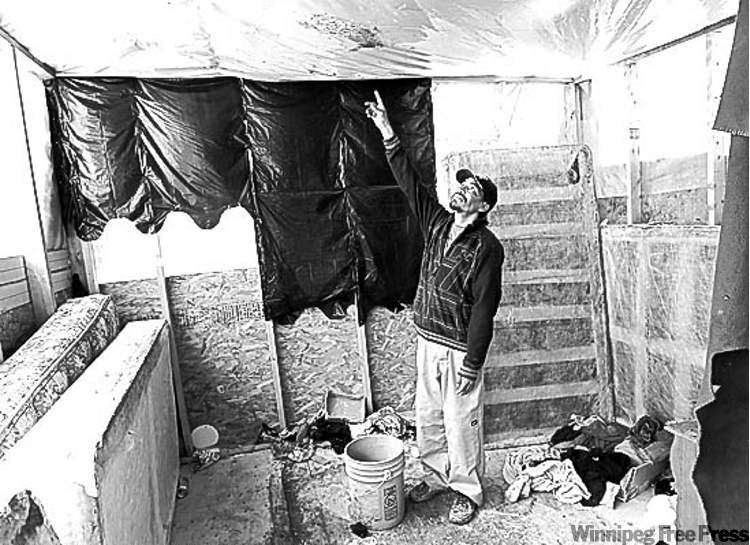
Over the next three years, Ottawa has budgeted about $40 million for big water-and-waste projects on Manitoba reserves, and St. Theresa Point is slated to get another batch of pipes in 2013. It’s not clear yet where those pipes might go or how many homes might get water and sewer services.
But those new pipes will be another micro-step in the tediously slow process of bringing running water to the four Island Lake reserves, a process that seems to have no end in sight.
Roughly every five years, a community gets a new treatment plant or a new batch of pipes, and every summer 10 or a dozen or 20 homes get built or retrofitted so a family can finally use a real flush toilet instead of a slop pail. Meanwhile, the population of the Island Lake First Nations continues to grow and the other 60-plus reserves also scramble to grab scarce federal capital dollars every year to upgrade ailing treatment plants. Staff in the Manitoba office of Aboriginal Affairs and Northern Development Canada can’t even guess when all 800 homes in Island Lake will have running water — five years? A decade? A generation?
“I think there’s very much a strong focus on water and waste water,” said Anna Fontaine, Aboriginal Affairs’ Manitoba regional director. “It’s one of this government’s priorities.”
Fontaine, who didn’t have running water herself in her home on the Skownan reserve until she was five years old, has toured many homes like the Raes’ in most of the four Island Lake reserves.
“The challenges are great,” she said. “I feel for our communities. It keeps me awake at night.”
One Aboriginal Affairs official said he’d love to be at 100 per cent after the next five-year capital budget is done, but he knows he won’t be.
That’s unless Ottawa earmarks significant dollars — anywhere from $66 million on up for Island Lake alone — to solve the problem once and for all.
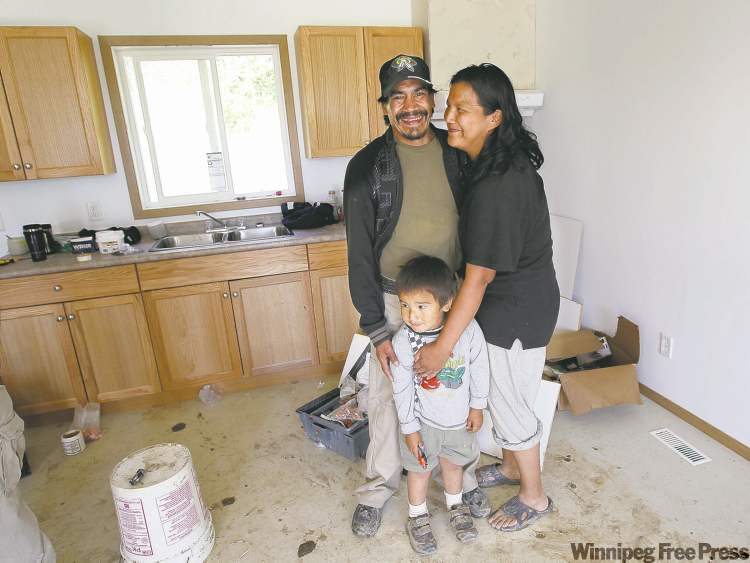
When Prime Minister Stephen Harper was in town last month for the Winnipeg Jets’ home opener, Premier Greg Selinger bent his ear about northern water issues. And Manitoba Aboriginal and Northern Affairs Minister Eric Robinson is planning to fly to Ottawa in mid-November to speak to federal Aboriginal Affairs Minister John Duncan about Island Lake’s plight.
Duncan had agreed to squeeze in a seven-minute interview with the Free Press last week, but cancelled at the last minute due to a scheduling conflict.
Staff at the Manitoba office of Aboriginal Affairs caution that the days of extra economic stimulus money are likely over, and Ottawa’s deficit-reduction plan does not bode well for an influx of extra cash for water and sewer projects in the coming years. They say they are doing what they can within existing budgets.
— — —
Before the Raes could move into their new house, things had to get worse.
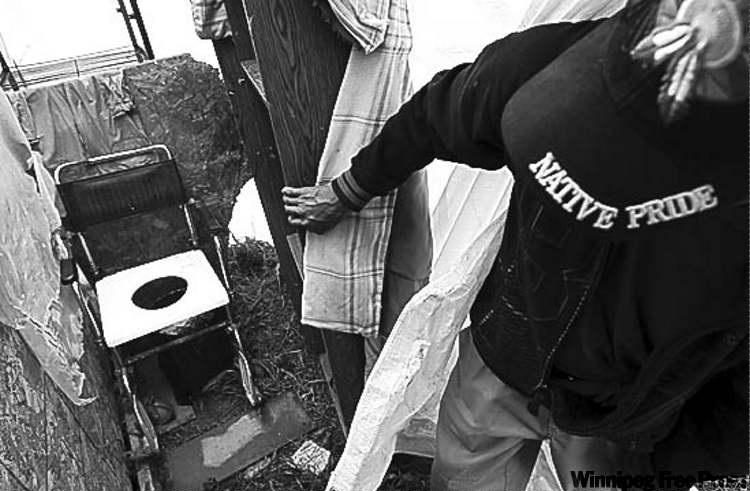
While workers installed new cabinets, flooring, drywall and an entire bathroom, the Raes spent the summer living in a tarp house in their front yard. It was stiflingly hot and smelled of urine and damp, mouldy mattresses. The slop pail and commode chair were nestled outside under another tarp. Or the family used the old outhouse.
In the tarp house, running water of another kind plagued the family.
“Rain went through the ceiling again. I don’t know how many times I’ve fixed it,” said Rae. “Finally, I couldn’t stand it, it was too wet, too damp.”
That’s when Rae and his family packed it in, taking refuge in emergency housing down the road.
With mainline water pipes just a few tantalizing metres away from the Raes’ front door, it was still going to take an extra week of construction to get the pipes hooked up.
“He’s waited this long, he can wait another week,” a plumber working inside the house said with a laugh.
The family got the “full-meal deal,” according to another tradesman — a bathroom like any other, upgraded electricity, a new furnace. It was a total gut. The new house is clean and filled with light.
Over the summer, housing construction supervisor Fabian McDougall’s crews built 18 new homes and renovated 11, retrofitting them all with running water, either by pipes or cisterns.
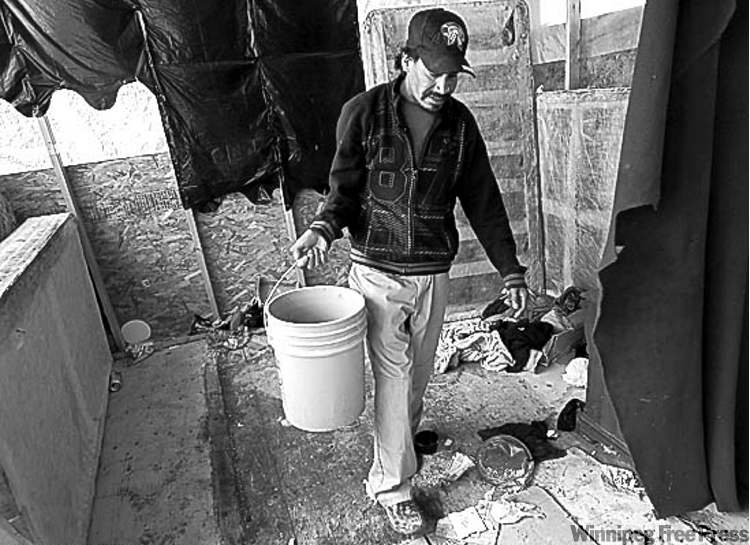
McDougall is now waiting to find out how much federal funding the band might allocate to housing next year, and even in August, he was getting antsy. The winter road is open only for a month or six weeks, and all supplies — every toilet, every nail, every piece of drywall — must be ordered and shipped in that short window. A screw-up means a house doesn’t get finished in time for winter.
“Every house that we build, every family is very grateful,” said McDougall.
“Around here, when you get a new house or get your house renovated, it’s like winning the lottery.”
maryagnes.welch@freepress.mb.ca
History
Updated on Saturday, November 5, 2011 8:56 AM CDT: adds photos, links, fact box, video


